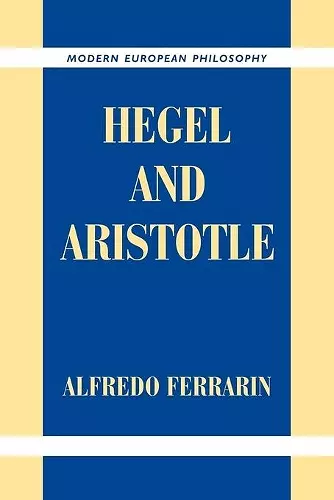Hegel and Aristotle
Format:Paperback
Publisher:Cambridge University Press
Published:19th Jul '07
Currently unavailable, and unfortunately no date known when it will be back
This paperback is available in another edition too:
- Hardback£82.00(9780521783149)

This book systematically examines Hegel's idealism in relation to the metaphysical and epistemological tradition stemming from Aristotle.
Hegel is, arguably, the most difficult of all philosophers. To find a way into his thought interpreters have usually approached him as though he were developing Kantian and Fichtean themes. This book demonstrates in a systematic way that it makes much more sense to view Hegel's idealism in relation to the metaphysical and epistemological tradition stemming from Aristotle. The book offers an account of Hegel's idealism in light of his interpretation, discussion, assimilation and critique of Aristotle's philosophy. There are explorations of Hegelian and Aristotelian views of system and history; being, metaphysics, logic, and truth; nature and subjectivity; spirit, knowledge, and self-knowledge; ethics and politics. No serious student of Hegel can afford to ignore this major interpretation. It will also be of interest in such fields as political science and the history of ideas.
'A great book. Ferrarin brings to the fore the broader background of Hegel's interpretation of Aristotle. Ferrarin shows (but never shows up!) a deep knowledge of these issues. He avoids the pitfalls of any comparative study. He does not satisfy himself with observing that Hegel was influenced by Aristotle - which would be belabouring the obvious. He shows why, for what inner reasons, Hegel had to see in Aristotle a brotherly mind.' Rémi Brague, author of Aristolte et la question du monde and La sagesse du monde
'Ferrarin's book is the first complete and detailed study of the agreements and differences that unite and separate Hegel and Aristotle. In fact, he offers much more, because he dwells also extensively on Hegel's relations with several other classics who influenced his attitude with regard to Aristotle, such as Plotinus, Proclus, Spinoza, Leibniz, and Kant. Ferrarin's competence guarantees solid interpretations of these philosophers; in several passages, his considerable erudition is even so overwhelming that the reader must be quite focused to keep track of the overall orientation of Ferrarin's impressive study … This ambitious program could never have been realized without a very thorough and detailed knowledge of two of the most difficult and well-studied but still perplexing philosophies of the European tradition. Fortunately, Ferrarin is in full possession of these conditions. His book is certainly the most complete and informative study of Hegel's interpretation of Aristotle and of the Aristotelian elements that can be found in Hegel's thought.' Adriaan Peperzak, author of The Owl of Minerva
'Ferrarin's book on Hegel and Aristotle remains a milestone for all future investigation on the topic. It is an exegetical study of details of crucial value, one that surpasses all partial work that has been done so far.' Angelica Nuzzo, author of Hegel-Studien
'This ambitious and exciting book … Ferrarin demonstrates remarkable control of a range of problems in Hegel, Hegelian studies, and the bibliographical issues raised by this tradition. Here Ferrarin's scholarly skills are at their impressive best.' Helen S. Lang, The Review of Metaphysics
'Ferrarin most thoroughly compares the Metaphysics with the Science of Logic and On the Soul with the Organics and Subjective Spirit sections of the Encyclopaedia. The latter comparison forms the center of the book, and all scholars of Aristotle and Hegel will benefit from it … One can only hope that this fine book helps reorient Hegel scholarship toward deeper study of Aristotle and awakens interest in Hegel among Aristotelians.' James H. Wilkinson, The Journal of the History of Philosophy
'Ferrarin believes that Hegel's interpretation should be analyzed philosophically, that is, problematically, and his book is the best result one could achieve from this point of view.' Riccardo Pozzo, American Catholic Philosophical Quarterly
'Ferrarin's extraordinarily rich and weighty volume … is supported by a profound knowledge not only of Hegel, but also of the Aristotelian texts and of the crucial issues debated by ancient historiography … Ferrarin rightly ascribes to Hegel the merit of seeing that for Aristotle actuality cannot be comprehended independently of actualization.' Franco Trabattoni, Rivista di storia della filosofia
'Ferrarin is admirably qualified to undertake the difficult task of comparing these two great thinkers … The book is an extraordinarily rich resource, packed with interesting and original insights.' Dermot Moran, Bulletin of the Hegel Society of Great Britain
'Ferrarin deals with a long neglected topic in his thorough investigation … We can hope that it affirms its place not only in the scholarship on Hegel but also on that on Aristotle.' Stephan Eberle, Philosophisches Jahrbuch
'This book does more than simply read Aristotle through Hegelian lenses.' Joachim Oberst, Ancient Philosophy
'… this impressive piece of work, an asset, if not a sine qua non, to any future research on Hegel's interpretation of Aristotle.' Australasian Journal of Philosophy
'There is almost nothing of any significance on the relation between Aristotle and Hegel, and Ferrarin's book wonderfully fills that gap. Everything in it is to be praised. There is the very knowledgeable mastery of the literature on both figures; the use of the text is extremely subtle and gifted; the use of various critical editions of Hegel's work is splendidly accomplished; and there is great subtlety in expanding the senses of various Greek and German terms.' Terry Pinkard, author of Hegel: A Biography
ISBN: 9780521037754
Dimensions: 228mm x 152mm x 26mm
Weight: 697g
468 pages